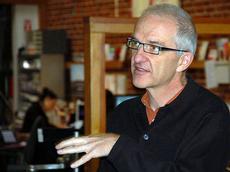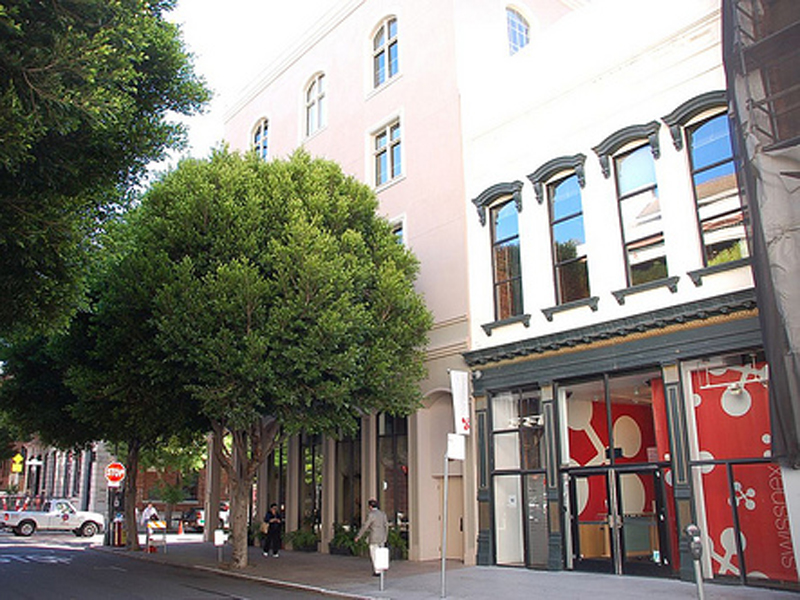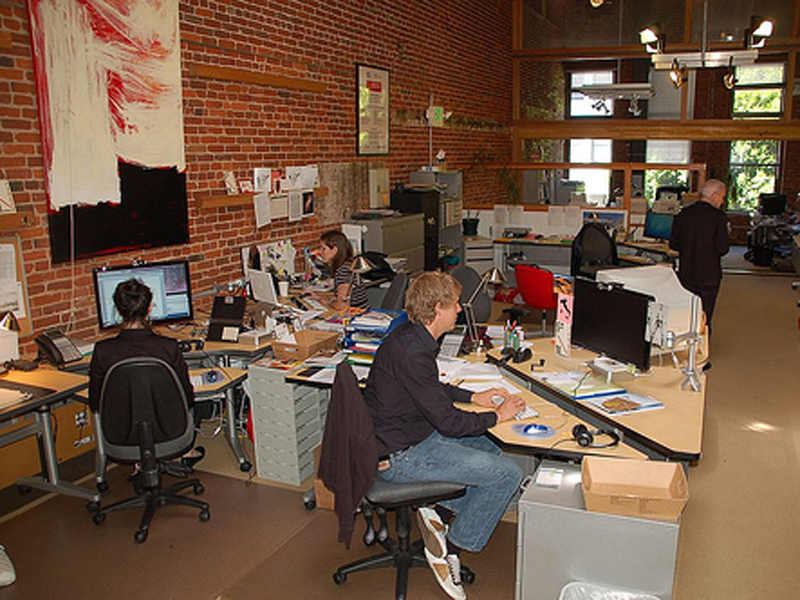The man with connections
He’s been living in California since 1997 and he has been one of the driving forces behind creating a new type of Swiss scientific diplomacy: Christian Simm, founder and executive director of swissnex San Francisco. Roman Klingler, ETH media spokesperson and currently on sabbatical in San Francisco, met up with him. Notes on an encounter.

If I had to characterise Christian Simm as a punctuation mark, it would be the hyphen. Wherever he has worked in the past twenty years, he has networked, connected, and brought people and ideas together. In actual fact, Christian as a child, like so many other small boys, dreamt of being an astronaut. Things didn’t quite turn out that way, but by founding swissnex San Francisco eight years ago, Simm has nonetheless fulfilled a dream. As part of a global network, swissnex San Francisco promotes the exchange of knowledge and ideas in the fields of science, education, art and innovation. The motto of Simm and his associates is: connecting the dots. It sounds decidedly unspectacular, but what it means in practice is that by joining up two points, something entirely new is often created.
Raised in Lausanne, Christian Simm studied physics at EPFL, where he earned his doctorate in Plasma Physics. It didn’t take him long to realise that connecting and bringing together ideas and people appealed to him more than a career in science. He made his first forays into PR while studying for his doctorate. After a two-and-a-half year stint in Canada, he returned to the EPFL in 1990, where the CAST centre for scientific and engineering support had just been established. Three years later, Simm was director of the technology centre. “While I was there, I learned a great deal about cooperation between universities and private industry”, recalls the founder of swissnex. The CAST business model was that of a public-private partnership: the EPFL provided the infrastructure, and the people at CAST were financed by industry and by donations and sponsorship.
In the eye of the hurricane
In 1997, the Swiss Science Agency, as it was called at the time, advertised for the post of an additional science and technology counsellor. There was already one position each in Brussels and Tokyo, and two in Washington D.C., and for the first time, this post was to be established not in a national capital city, but in San Francisco. Simm applied – and got the job. “What followed was the craziest time of my life”, says Christian Simm, “because I was right in the middle of a whirlwind that had seized the entire Bay Area, and in which everybody was totally convinced that the Internet would revolutionise the world, right there and then”.
San Francisco, the entire Bay Area and the conurbation around Boston, on the East Coast of the USA, became the recognised hubs of innovation that were also attracting Swiss nationals in increasing numbers. It was Simm’s job as technology counsellor to observe, interpret and report back to Switzerland on this seething chaos of creative energy, where new technologies were being created that had the potential to turn entire industries on their heads. It soon became clear to him, however, that it was no longer possible for him to carry out his job single-handedly from an office at the Consulate. In the tumult of the dawning Internet age, one had to come up with an idea ‘in order to be heard’, says Simm. The Internet boom in the mid-1990s thus also acted as the catalyst for him to examine his own role as a technology counsellor.
swissnex – an idea is born
In Xavier Comtesse, who was stationed in Washington in the mid-1990s as a technology counsellor, Christian Simm found an ally. In long conversations, the two developed the idea of creating a new space for people to meet, beyond the four walls of the official diplomatic missions. The time was ripe for something new. Switzerland’s Secretary of State for Science and Research at the time, Charles Kleiber, supported the initiative. Xavier Comtesse set up in Boston and Christian Simm in San Francisco – with swissnex. And shortly after that, their counterpart outpost in Singapore began operations. The swissnex network, run on behalf of the Swiss federal government, consists nowadays of five representative outposts, in Boston, Bangalore, San Francisco, Singapore and Shanghai.
The two-storey swissnex San Francisco building at 730 Montgomery Street is a stone’s throw from the Financial District and just blocks from the Swiss Consulate General. Built in 1852, the building housed the Golden Era newspaper in its early days, for which a certain Mark Twain among others used to write. The brick building has since survived three earthquakes without serious damage. Christian Simm is convinced that the location has an influence on the atmosphere, that radiates a certain gravitas. He runs swissnex as shared office space – in addition to his ten colleagues, the building is also used by Swiss start-up firms and the ‘Greater Zurich Area’.
The corporate aspect
Swissnex San Francisco sees itself as a platform for raising Switzerland’s profile in the fields of science, education, art and innovation on the West Coast of the US. Another of Simm’s tasks is to track trends, keep his ear to the ground and anticipate what the next big thing could be in a region that consistently generates technological shockwaves that are felt the world over. Ultimately, the boss of swissnex San Francisco is also a businessman, as two thirds of all project costs must be covered by third-party funds, as dictated by the organisation’s performance mandate.
730 Montgomery Street has now become an essential port of call for people, start-up companies and universities from Switzerland who are looking to gain a foothold in the Bay Area. Swissnex organises study trips, offers advice and brokers introductions also organising some 70 public events each year on a wide variety of topics. From a discussion on international humanitarian law to the latest findings from sleep research or an exhibition about light, anything is possible. In line with the organisation’s ‘connecting the dots’ motto, the event concept involves bringing visitors from Switzerland together with people from the Bay Area for networking and exchanging knowledge.
No substitute for real encounters
At swissnex San Francisco, ETH professor Konstantinos Boulouchos discussed in March energy strategies with a colleague from Stanford University; in June ETH computer scientist Professor Markus Gross talked about computer animation for the entertainment industry together with a Disney representative. We are the ‘facilitators’, as Christian Simm characterises his own understanding of his role. It is that of a host, who provides a safe venue for encounters that otherwise would not take place. A role that clearly suits Simm, the polyglot, who is familiar with both worlds. What swissnex does, ultimately, can be interpreted as a new form of the diplomacy of good deeds.
It may sound paradoxical, says Simm, but precisely due to the possibilities offered by the virtual worlds that now increasingly characterise our communication, face-to-face encounters have become even more important. I may have hundreds of contacts, but the ones I will remember are those that I know personally. And it is these personal contacts that can make the difference between a deal finally being struck, or somebody from Switzerland managing to establish themselves here in the Bay Area.
About the author
Roman Klingler studied Political Sciences at the University of Lausanne, and worked as a journalist (print and TV) for more than twelve years before joining the Corporate Communications department at ETH Zurich. He has been Head of the Media Relations team since 2006. He is currently spending his sabbatical at swissnex San Francisco. Swissnex is a network of outposts that promotes the exchange of knowledge and ideas in science, education, art and innovation in Asia and the USA. The network operates on behalf of Switzerland’s State Secretariat for Education and Research, and is present in Bangalore, Boston, San Francisco, Singapore and Shanghai.










READER COMMENTS